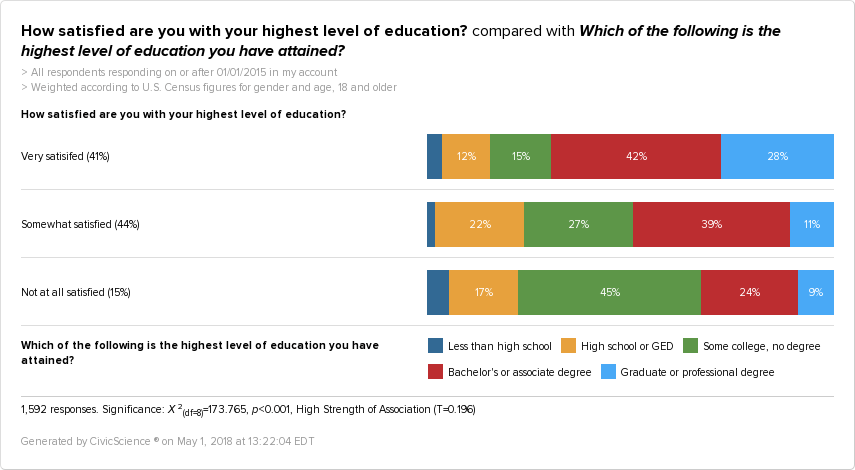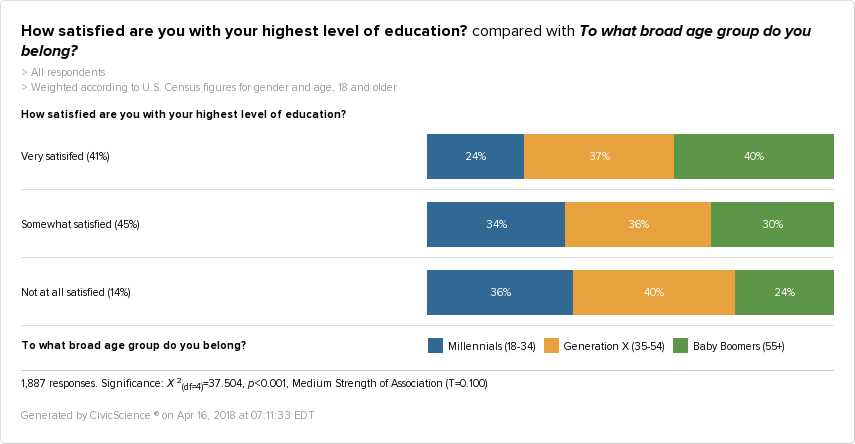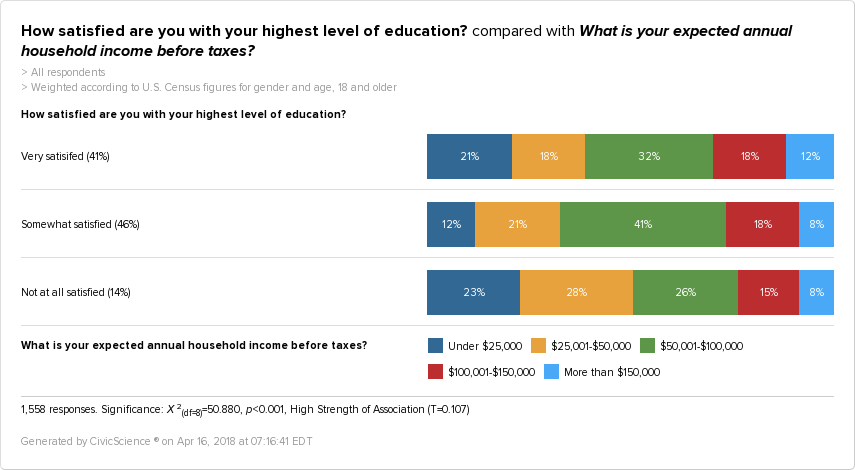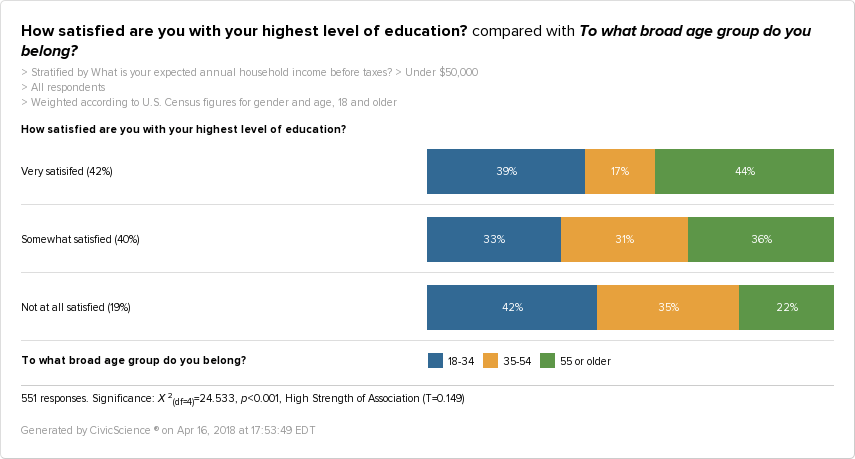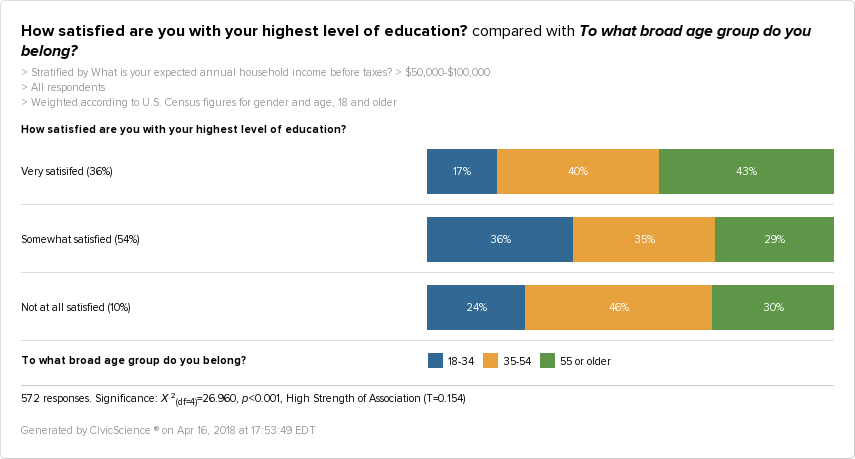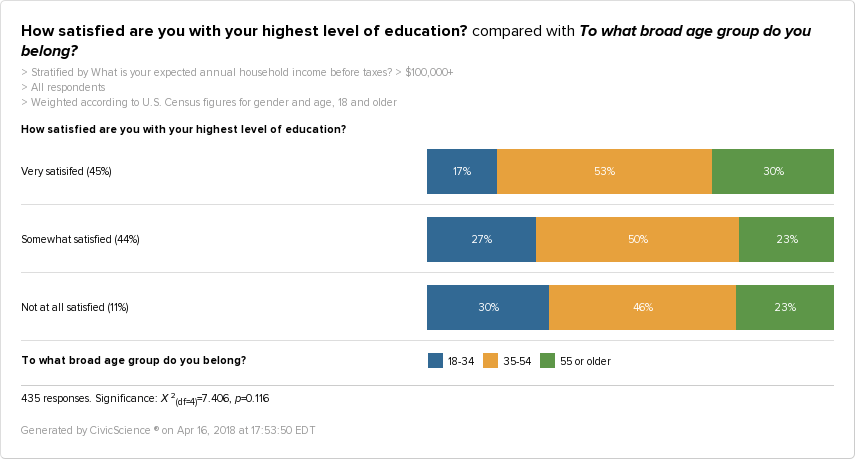The Gist: The majority of US adults are at least somewhat satisfied with their highest level of education. For those who are not happy, a large percentage report having started college, but not finishing it, indicating that college degrees do still matter.
College acceptance season is upon us. This time of year, high school seniors across the country are making tough decisions, opening acceptance (or rejection) letters, and navigating the rocky transition from high school to the world beyond. Although higher education is more common than ever before, going to college may not be the right choice for everyone. After all, there are countless career paths that do not follow the college route but are just as viable a choice as anything that requires a degree.
All of this got us thinking, how satisfied are US adults with their highest level of education? On the surface, it seems like a simple question. But as we dug in, we discovered that there was a lot to learn.
Our first question revealed that almost half of US adults–45% to be exact–are somewhat satisfied with their highest level of education. That’s not bad, especially considering the fact that 41% are very satisfied. So, the vast majority of responders are at the very least content with the education they received. As for the rest, 14% are not at all satisfied. So, of course, we’re going to break this down.
Let’s start by taking a look at satisfaction with education versus the highest level of education received.
While we could have guessed that those with higher levels of education tend to be more satisfied (they likely chose to pursue those higher degrees for a reason), it’s important to pay attention to one particular group of responders. Of those who indicated that they were not at all satisfied with their highest level of education, 45% reported some college, no degree.
This was consistent across all age groups. Whether just starting out, about to retire, or somewhere in between it’s clear that, starting but not finishing college tends to lead to a greater rate of dissatisfaction.
Of course, beginning college and actually making it to graduation day are two very different experiences. The reported level of dissatisfaction from those who did not end up finishing college sheds light on a large group of individuals who could be poised to make some major changes in their lives. And whether that means finishing their degree, going to trade school, or otherwise increasing their knowledge, this is one group of adults that should not be overlooked.
Next, we evaluated responders by age range to see if life stage could influence overall education satisfaction.
A quick look at the data might lead you to believe that satisfaction and age are intertwined. After all, Baby Boomers make up the largest group of responders who are very satisfied with their education, coming in at 40%. However, as we look a little closer, a few small but meaningful points stand out.
The somewhat satisfied category seems to hit all generations relatively equally, indicating that no matter your age, there’s a reasonable chance you might be looking to take the next step, which could include furthering your education. As for those who are not at all satisfied, Gen X-ers make up 40%, and Millennials are not far after at 36%. Looks like the (early to) mid-life crisis phenomenon may be very real, after all.
So, when it comes to satisfaction with education as compared to age, the most satisfied group is skewed towards a more mature crowd. However, this trend does not hold for the other categories, instead revealing that people of all ages could be looking for–or at the very least, open to–an opportunity for another degree, and the chance to pursue something that would lead to greater satisfaction.
But how does money factor in? It always does, after all. We compared our initial question on education satisfaction to one on anticipated annual household income to see what came up.
As it turns out, the majority of those who are very satisfied with their highest level of education are not all making six figures. Actually, most of them are not. Of those who report being very satisfied with their highest level of education, 32% are making $50,001- $100,000 a year. This backs up studies that reveal $75,000 is the yearly salary that provides the most happiness.
But, there is another interesting twist to this tale. Let’s look specifically at responders who make less than $25,000 a year. While 21% of those who make less than $25,000 a year report being very satisfied with their highest level of education, 23% are not at all satisfied. The percentages here are almost identical. This indicates that satisfaction with level of education and expected income may not be as closely linked as we may have thought.
The data below seems to agree.
Just out of curiosity, we compared satisfaction with education, age, and expected annual income. Brace yourself; the results may surprise you.
Less than $50k
$50k-$100k
More than $100k
As it turns out, the largest percentage of Millennials who are very satisfied with their highest level of education actually make less than $50,00 a year. While 39% report being very satisfied and making less than $50k annually, that percentage drops to 17% and plateaus as we look into the upper-income levels. Gen X-er’s are the complete opposite, with satisfaction percentages increasing (rapidly) at each notch up in income. And Baby Boomers, well they’re equally as satisfied with their education whether they’re making less than $50k or up to $100k.
So, how much does having a high level of education matter? As a general rule, those with more degrees tend to report a higher level of satisfaction with the education they received. However, the only age group that becomes statistically more satisfied with its education as its income increases is Generation X. This could be due to the fact that those in this demographic are more likely to be in a life stage where they are competing with others who have more advanced degrees. So, the rewards of a higher degree–like increased income–are especially important.
As for those who are unsatisfied, the majority started college but were not able to finish it. So although higher education in the 21st century can take on many forms, ultimately, it seems that for most US adults, a college degree maintains a high level of prestige.

